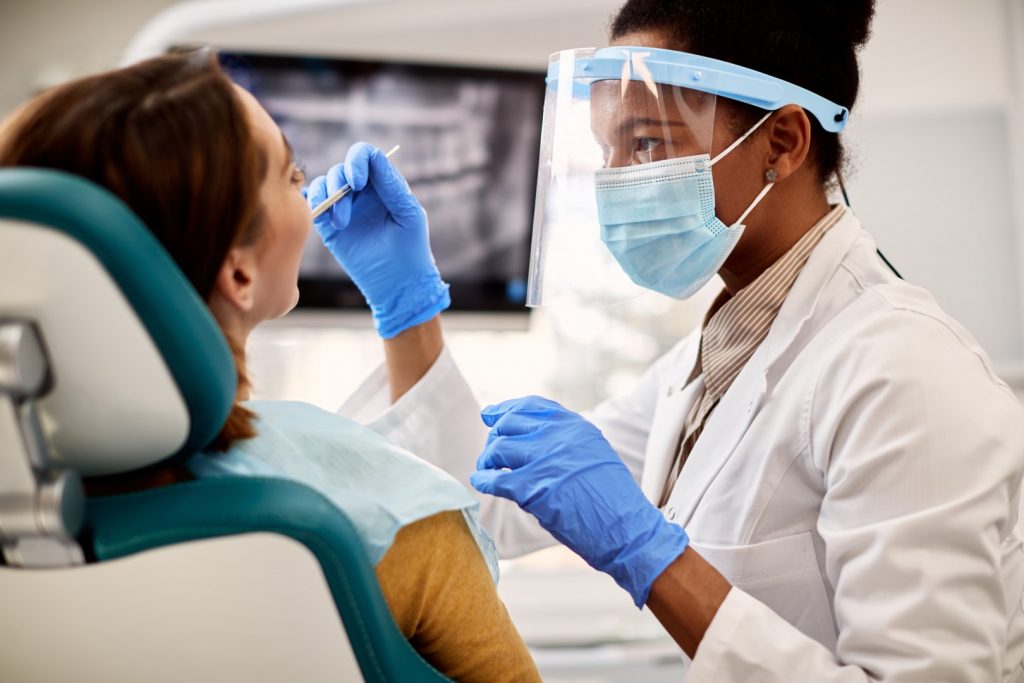Information Library
Start Reading

Are you experiencing tooth pain or sensitivity? Your symptoms could be signs of a tooth infection or a tooth abscess.
Keep reading for important information about tooth infections and abscesses. Recognizing symptoms of tooth infection and getting treatment as soon as possible is crucial for avoiding more serious issues.
 Tooth infections commonly start with tooth decay, the destruction of tooth enamel by plaque—a sticky bacterial film that’s constantly forming on the teeth. These bacteria feed off the sugary foods we eat, forming harmful acids that cause cavities.
Tooth infections commonly start with tooth decay, the destruction of tooth enamel by plaque—a sticky bacterial film that’s constantly forming on the teeth. These bacteria feed off the sugary foods we eat, forming harmful acids that cause cavities.
Once bacteria invade the tooth’s inner chamber of sensitive pulp through the cavity, you can experience a painful toothache.
Cracks and chips in tooth enamel, if left untreated, can also lead to infection and pain. Enamel is like armor for your teeth, and any “chink in your armor” puts your teeth at risk of decay and disease.
A tooth abscess occurs when an infection inside the tooth spreads to the tooth’s pulp chamber, causing inflammation. At a certain point, the irritation is irreversible (irreversible pulpitis). The pulp dies and an abscess, or pocket of pus, develops.
The abscess is painful, and the infection can now spread from the tooth to the gums, sinuses, jawbone—even into the brain. At this point, only professional oral health treatment can stop the infection.
 Tooth infection starts small and progressively becomes more serious. People may initially experience only a few dental infection symptoms.
Tooth infection starts small and progressively becomes more serious. People may initially experience only a few dental infection symptoms.
The signs of a tooth infection and a tooth abscess are similar. They may include:
Knowing these dental infection symptoms can help you catch a tooth infection early, while it is still reversible pulpitis.
An endodontist is a dentist who specializes in saving diseased teeth. They can eliminate the tooth infection and/or the tooth abscess.
Depending upon the severity of your case, they may use any of the following treatments:
The endodontist makes a small incision in the abscess to drain the pus, then washes out the area with salt water.
If the infection is limited, you may not need antibiotics. But when it has spread to other teeth and the gum tissue, antibiotics will prevent it from progressing further.
Root canal treatment involves removing the diseased tooth pulp tissue and draining the abscess.
Once the endodontist cleans out the tooth to prevent subsequent infection, they fill the pulp chamber and seal off the tooth. They may also cap the tooth with a crown to keep it strong.
A restored tooth can last a lifetime when cared for properly.
The endodontist will only pull the tooth when root canal treatment cannot save it.
After the abscessed tooth is extracted, a prosthodontist—a dentist who specializes in repairing and replacing teeth—should replace it. They may use a dental implant, bridge, or dentures. The replacement will prevent other teeth from shifting to fill in the gap.
 Practicing proper oral hygiene is essential for preventing tooth infection. Brushing your teeth twice a day with fluoride toothpaste on a soft-bristled brush removes the plaque that causes tooth decay. Flossing properly at least once a day also helps remove plaque.
Practicing proper oral hygiene is essential for preventing tooth infection. Brushing your teeth twice a day with fluoride toothpaste on a soft-bristled brush removes the plaque that causes tooth decay. Flossing properly at least once a day also helps remove plaque.
Additionally, regular checkups and teeth cleanings not only help with plaque removal but also allow dentists to monitor your mouth for any signs of a tooth infection. The sooner a dental professional can catch a tooth infection or tooth abscess, the more likely they will be able to successfully treat it.
If you are experiencing the symptoms of a tooth infection or a tooth abscess, schedule an appointment with the endodontics team at Penn Dental Medicine (PDM) immediately.
Our skilled third- and fourth-year student dentists, practicing under the close supervision of highly respected professionals, can diagnose and treat the problem, stop the pain, and get your teeth healthy again.
For more information about the advantages of choosing PDM endodontics for your dental treatment, download your free copy of our flyer, “What to Look for in an Endodontist.”
If you’re ready to get help for your tooth infection or dental abscess, schedule your appointment online or call us at 215-898-8965.